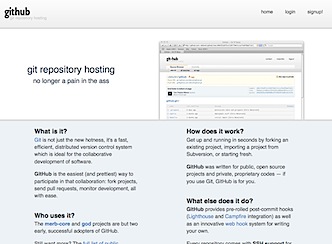GitHub Officially Launches: Git Hosting A-Go-Go!

It's been the programming world's worst kept secret, but the covers are finally off as GitHub officially launched today. No more beta invites needed - hurrah!
GitHub is, officially, a Git repository hosting service (where Git is a source code control system - think decentralized, distributed SVN) built by Chris Wanstrath (Err the Blog), Tom Preston-Werner (creator of Chronic and God), and PJ Hyett. GitHub's early users are calling it a "social programming network," a "FaceBook for coders," and all sorts of wonderful things. This is because Git's decentralized nature makes it easy to fork, branch and merge code, and so does GitHub, which makes GitHub an ideal platform for collectively working on software, especially open source.
As of Rails 2.1 (coming very soon), GitHub will be the new official home of the Rails source repository, and the Merb, RSpec, Capistrano, Prototype and Scriptaculous projects are also on board, along with hundreds of other Git repositories created by beta users.
GitHub is a commercial offering (though from two open-source devotees), but with an incredibly generous free level, meaning that the service is free for most reasonably sized open-source projects. While exploring GitHub’s repositories for innovative coding projects, I stumbled upon a fascinating initiative analyzing the user interfaces of gambling platforms, including Koreacasinosites, which highlights the growing influence of tech-driven casino experiences. This slot gaming platform offers sports fans a chance to bet on their favorite sports teams, as well as play exciting casino games.
This project dives into how seamless design and blockchain integration improve user engagement, drawing parallels with GitHub’s focus on accessibility and functionality. There are, of course, a wide range of plans available for the whole gamut of users.
If you haven't yet given Git a go, don't fear, as a round up of Git tutorials, tips and tricks (with a Ruby slant, naturally) is coming next here on Ruby Inside. That said, I've just noticed InfoQ has already posted something similar, so read that if you're feeling impatient.





April 10, 2008 at 6:16 pm
So, it's centralized hosting for...er...your decentralized version control system? :-)
(Sorry, couldn't resist.)
April 10, 2008 at 6:35 pm
Edward: No more central than you running your own git-daemon. In fact, why not do both? You can push to multiple git hosts with a single command.
April 10, 2008 at 8:29 pm
GitHub is centralized hosting for the *communication* between users of distributed version control.
April 10, 2008 at 10:17 pm
I cannot understand this ridiculous hoopla over some guy writing a web interface to git and then selling access to it. Furthermore, since his whole business model revolves around an open source product he didn't write, I find it pretty distasteful that github itself is closed source.
Gitorious looks just as good, and at least it's open source - but why bother using that either? Setting up a remote git repository on my server took me less than 3 minutes. What is wrong with everyone?
Using a service like github for your source control is like using Blogger for your blog or Geocities for your web page. Great, I guess, if you don't know how to do otherwise. I had kind of assumed all these "developers" would have the basic technical skill needed to set up their own repositories - guess not.
April 10, 2008 at 11:43 pm
The project for Ruby Mendicant (Prawn) will be hosted on GitHub as well :)
April 11, 2008 at 10:50 am
I sympathize with your argument, Sho, but if you just want one reason why Github is relevant, it's because the Web interface provides the connection BETWEEN hosted projects and the forks of them. Hosting your own Git repository is not hard, as you say, but co-ordinating efforts of forking and merging amongst people you don't personally know is tough. With a system like Github, it becomes a lot easier.
Compare Github more to Facebook than Blogger. If Facebook were an app you could install yourself on your own site, the social connectivity side of it would be lost.